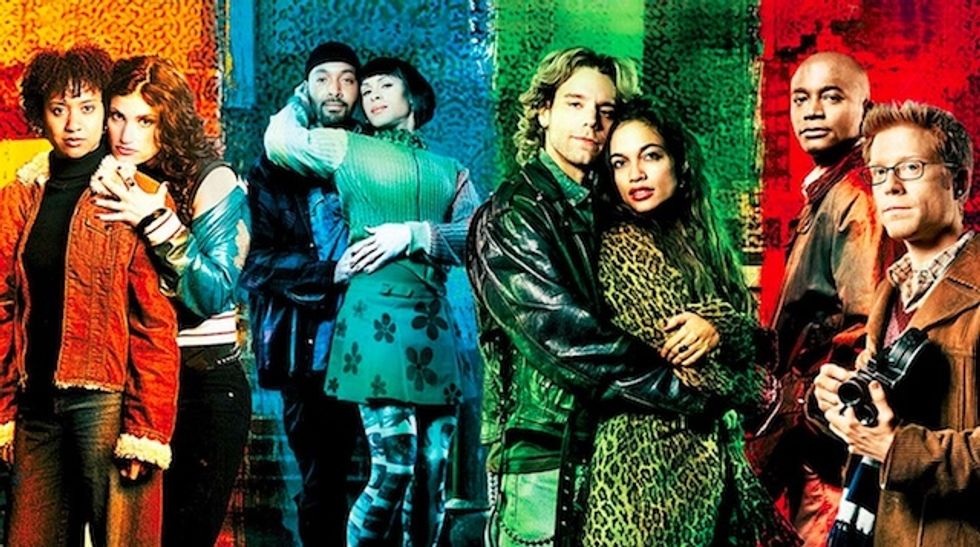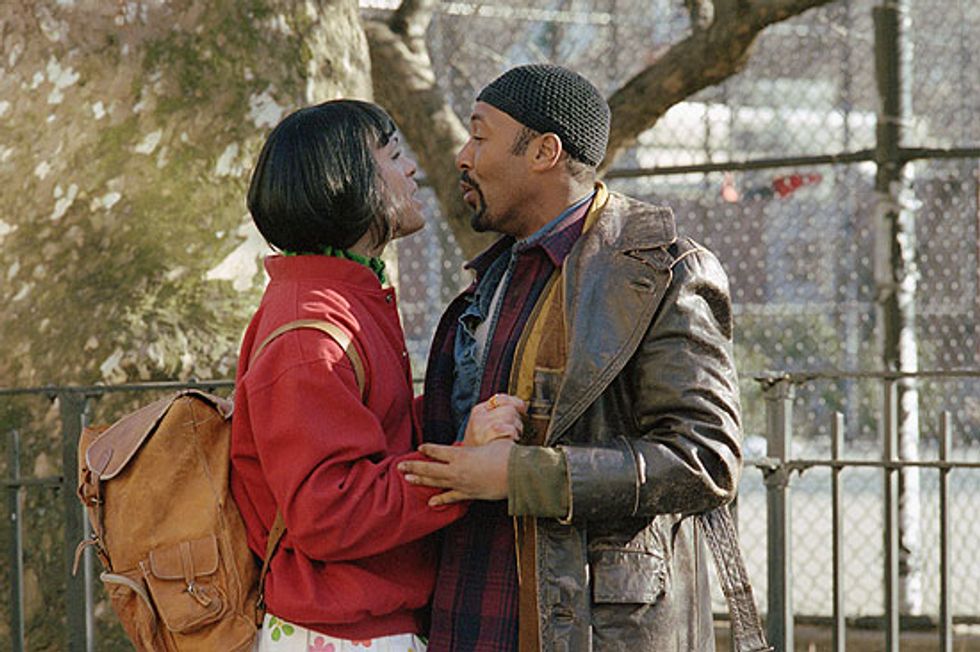It's been more than 20 years since the Broadway show "Rent" first appeared on stage and shocked audiences with its loud, unapologetic portrayals of issues like drug abuse, poverty, alternative sexualities, the extremely taboo topic of the AIDS crisis.
Two decades later, queer representation has thankfully much more prominent in the media with shows like "Orange is The New Black" and "Transparent" receiving critical praise for their nuanced and realistic depictions of LGBT experiences. With countless new shows, books, and films, centered around different aspects of the queer lifestyle it's say to forget how rare and risky the the portrayal of non-straight characters was only a few years ago. While today's audiences might find "Rent" too safe or dated to truly due justice to these issues, it's still important to remember that despite its many problematic elements, the show played an essential role in paving the way for inclusion and diversity in pop culture.
In both real life and in fiction, "Rent" built a legacy on exploring the impact of early death and the way people persevere in the face of tragedy. First conceived by playwright Billy Aronson as an updated retelling of Puccini’s 1896 opera La Bohème about young, struggling bohemian artists, "Rent" is set in New York City’s East Village in 1989 and follows a group of 20-somethings battling poverty, homelessness and the ongoing AIDS outbreak. Aronson and his roommate, then 29-year-old composer Jonathan Larson, developed a musical meant to represent the contrast between “the luscious world of opera” and their own experiences living in the gritty, “destitute” part of Hell’s Kitchen in shadow of the AIDS crisis that loomed “over everyone’s head." Unfortunately, Larson, unexpectedly passed away from heart complications just three nights before Rent’s first Off-Broadway premiere in January 1996 and never witnessed the long-lasting effects of his artistic efforts.
Despite its characters vehement rejection of consumerism, Rent was a massive commercial and cultural phenomenon. When the original production premiered on Broadway in 1996 the show was an immediate hit, winning both the Tony Award for Best Musical and the Pulitzer Prize. "Rent" was praised by the New York Times as “A landmark rock opera!” The production ran for 12 years and grossed over $280 million in ticket sales. In 2005, Rent was adapted into a film by Academy Award nominated director Chris Columbus. The film version starred the majority of the original Broadway cast including Idina Menzel and Adam Pascal.
The show follows Mark, an aspiring filmmaker whose ex-girlfriend Maureen left him for another woman: Joanne a successful lesbian attorney. As Maureen attempts to stage a social protest to save her performance center from destruction at the hands of their wealthy landlord, Mark’s roommate Roger, a musician and recovering heroin addict dying from the AIDS virus, becomes involved with a young exotic dancer called Mimi who has also been infected with HIV.
While featuring both straight and queer characters suffering from AIDS, The most impactful storyline in the film occurs between two HIV/AIDs afflicted gay men. After Latino drag queen Angel rescues Collins, Mark and Roger’s former roommate, from a brutal mugging, the pair begin a heartfelt romance despite both knowing that their time together is brief. Unlike many previous AIDS narratives that focused on the suffering and devastation of the disease, Angel and Collins’s relationship is remarkable for the way their characters bravely approach each day by vowing to embrace life and pleasure. The romantic duet between the two men, “I’ll Cover You,” depicts their feelings towards each other not as a doomed romance but as something pure, simple and enthusiastic. Shot in the style of a traditional Old Hollywood movie musical, Angel and Collins skip hand-in-hand down the streets of New York City, bathed in sunlight and belt out how they’re thrilled to have finally found “Something as true as this.” Their open displays of affection throughout the song and lack of concern for both the public’s reaction and their own misfortunes offers a refreshing change and source of hope for queer audiences who are often accustomed to having their stories depicted as vehicles for angst and heartbreak.
However, Rent's portrayal of queer issues has also received backlash from critics such as lesbian writer and social activist Sarah Schulman who accuses Larson of appropriating minority experiences and “commodify[ing] LGBT life at the expense of actually representing the oppression to which these groups were subjected.” One of the most well known performances from both the show and the film is “La Vie Bohème,” a song celebrating the outcasts and misfits from all parts of life and encouraging people to come together and toast everyone and everything from “ “Bisexuals, trisexuals, homo sapiens, Carcinogens, hallucinogens, men, Pee Wee Herman, German wine, turpentine, Gertrude Stein.” While it may be argued that grouping these marginalized identities together with random symbols of bohemia and rebellion trivializes their struggle and presents an unrealistic, overly optimistic acceptance of alternative sexualities, Rent’s ideas of a ‘universal queer experience’ worked to normalize expressions of non-heterosexual for a straight, middle-class audience. The work brought attention to the challenges faced by poor, urban minorities in the midst of an epidemic that had largely gone ignored by the public and the American government. Much like Larson’s score which mixes the typical upper-class form of opera with contemporary rock music, "Rent" broke barriers between high and low culture by appealing to both urban minorities and traditional elite theatergoers. Although, Rent’s mainstream appeal may seem at odds with its anti-capitalist message, the musical argued that their was nothing inherently shameful or different about same-sex love and that those people living with AIDS should be treated, as the song says, “as an us for once/instead of a them.”
By placing Mark, a straight white male, in the role of a filmmaker documenting the day-to-day life of people living with AIDS, "Rent" creates an audience surrogate for the millions of viewers who are also getting their first glimpse of the effects of AIDS by watching the film. Mark’s character offers an entryway into understanding the queer culture of the 1980s by filtering the experience through a familiar perspective. When Angel invites Mark to attend a support group for people living with HIV, Columbus purposefully frames the scene to present Mark as the outside observer, showing him as separated and disconnected from the turmoil of the struggle by both his role as a videographer and his own heterosexual identity. While the “Life Support” members are seated in a circle of chairs to share their personal stories, Mark remains the sole person still standing. The choice to have him positioned literally above the rest of the actors symbolizes the attitude of moral superiority held by many Americans at the time who regarded people with AIDS as social lepers and felt that, to quote queer theorist Meryvn Silverman, “heterosexuals need not worry about this disease of gay men.”While the shot pans to the empathetic reactions of the group members as they listen to each other’s accounts of “living each day in fear,” Mark’s eyes remain hidden by the whirring, mechanical lens of his video camera, preventing the audience from seeing if these accounts caused him to experience any kind of emotional reaction. Mark’s lack of empathy and inability to fully connect with the others is further underscored when the casts’ voices all then blend together for the song “No Day But Today,” and Mark does not participate in the harmony. However, in the following scenes, Columbus uses a series of montages to show how Mark’s perspective evolves as he hears more stories from AIDS sufferers and begins to view them as people rather than just material for his film. In the second meeting, Mark is still shown filming from the periphery of the support group’s circle. However now he is holding his camera down to the side and giving more attention to the person speaking. In the final moments, though he still does not join in the main song (“Will I?”), the film cuts to a close up of him softly echoing the lyrics. The message of this vocal backup demonstrates his willingness to understand. He wants to silently show the group: I hear your pain, and I support you. Mark’s transformation parallels the cultural impact that Rent brought to its audiences by presenting individuals with HIV as human rather than faceless, cautionary tales. As Larson writes in the reprise of “La Vie Boheme,” Rent is meant to be a celebration of “people living with, not dying from disease.”
























